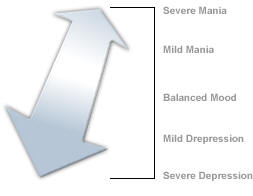Bipolar disorder introduction
The American Psychiatric Association Diagnostic and Statistical Manual for Mental Disorders, fourth edition (DSM-IV) defines that bipolar disorder is a chronic and recurrent mood disorder characterized by episodes of depression and of Mania.
Bipolar disorder is one of the most widely spread mental illness; it is considered as a state of re-occurrence and persistent destabilization of a person's mood.
Bipolar disorder is also known as Manic Depressive Illness because it usually showcases itself in a series of depression (low mood) and Mania.
 Bipolar disorder could occur in three unique episodes which include:
Bipolar disorder could occur in three unique episodes which include:
- Bipolar Disorder I
When the illness involves recurrent situations of mania and depressions. - Bipolar Disorder II
When it involves milder states of mania and more severe situations of depression and or hypoMania. - Rapid Recycling
When the situation is rapidly changing, and reaching a minimum of four series of mood changes within 12 months.
Causes
Though it typically develops in adolescent stage of a person first symptoms may occur during childhood. This illness poses a potential threat to the future of the society and of the world at large because it is one of the lead causes of suicide and it is currently not detectable by physiological medical diagnosis (through blood or brain scan).
Due to the fact that this bipolar disorder tend to run through families there had been much speculations that it might be a heritage disease and obviously transferred only through genes This has lead to various research and findings on actual cause of this disease. The research involved searching for specific genes Inside cells that plays significant roles in controlling the activities of the mind and body.
One of the researches, was built around the study of the disorder in an identical twin of a father with the illness, shows that though genes plays a role in causing the disease, it has also combined with some other factors which include the social and physical environments, to cause bipolar disorder. The research evidently reveals that bipolar disorder was dependant on genes and heredity factors, however those are not the entire factors that affects the transfer of the disease. This fact was established with the fact the the twins that came from a parent suffering from bipolar disorder, didn't suffer the disease, however it was also established that since of the the twins suffered the disorder, his immediate twin sibling as more possibility of suffering from the disorder than any other sibling.
Symptoms

- Manic bipolar disorder patient
However core symptoms of bipolar disorder are:
- Increased grandiosity/self-esteem
- Decreased need for sleep
- More talkative/pressure to keep talking
- Flight of ideas/subjective experience that thoughts are racing distractibility
- Increase in goal-directed activity/psychomotor agitation
- Excessive involvement in pleasurable activities that have a high potential for painful consequences (e.g., shopping sprees, sexual indiscretions, gambling, foolish investments or smoking)
- In addition, mood disturbance causes marked impairment in occupational or social domain; or is accompanied by psychosis.
 Manic Depressive symptoms include:
Manic Depressive symptoms include:
- Increased energy, activity, and restlessness
- Excessively "high," overly good, euphoric mood
- Extreme irritability
- Racing thoughts and talking very fast, jumping from one idea to another
- Distractibility, can't concentrate well
- Little sleep needed
- Unrealistic beliefs in one's abilities and powers
- Poor judgment
- Spending sprees
- Excessive smoking or courting other bad habits
- A lasting period of behavior that is different from usual
- Increased sexual drive
- Abuse of drugs, particularly cocaine, alcohol, and sleeping medications
- Provocative, intrusive, or aggressive behavior
- Denial that anything is wrong
Video: living with manic depression
Dark glasses and kaleidoscopes (1997)
A clear and concrete video that allows viewers into the minds of those afflicted with bipolar disorder. Also contains
information from psychiatrists about causes, treatments and the importance of family and peer support.
Play video (Real Player required)
Symptoms for Depressive episode
Symptoms for Depressive episode include:
- A depressed bipolar disorder patient
- Lasting sadness, anxious, or empty mood
- Feelings of hopelessness or pessimism
- Not wanting to spend time with friends and/or loved ones
- Feelings of guilt, worthlessness, or helplessness
- Change in eating habit to over eating or not eating enough
- Loss of interest or pleasure in activities once enjoyed, including sex
- Decreased energy, a feeling of fatigue or of being 'slowed down'
- Difficulty concentrating, remembering, making decisions
- Restlessness or irritability
- Sleeping too much, or can't sleep
- Change in appetite and/or unintended weight loss or gain
- Chronic pain or other persistent bodily symptoms that are not caused by physical illness or injury
- Thoughts of death or suicide, or suicide attempts
- A hypomania bipolar disorder patient
In a situation where the mania occurs to an average level, hypomania occurs and this is usually associated with good functioning and increase productivity, however hypomania ( if not properly treated )result in a severe depression or mania strike, which is quite dangerous to health.
Content outline
Multimedia
- Start 3D depression explanatory animation
- This video will help you to learn more on depressions, featuring intriguing 3d animation
- Start 3D animation explaining the bipolar disorder
- In this short animation video, you will learn more about bipolar disorder in an exciting multimedia environment.
Citing
- Childhood-Onset Schizophrenia
- Retrieved 19th December 2005 from: National Institutes of Health, US Department of Health and Human Services 2003 (NIH Publication Number: NIH 5124).
- Diagnostic and Statistical Manual for Mental Disorders, fourth edition (DSM-IV)
- American Psychiatric Association. Washington, DC: American Psychiatric Press, 1994.
- Depressive and bipolar mood disorders
- Hyman SE, Rudorfer MV. In: Dale DC, Federman DD, eds. Scientific American; Medicine. Vol. 3. New York: Healtheon/WebMD Corp., 2000; Sect. 13, Subsect. II, p. 1.Symptoms
- Risk factors for adolescent suicide: A comparison of adolescent suicide victims with suicidal inpatients
- Brent, D. A., Perper, J. A., Goldstein, C. E., Kolko, D. J., Allan, M. J., Allman, C. J., and Zelenak, J. P. Arch Gen Psychiatry 45, 581-588, 1988.
- The global burden of disease and injury series, volume 1: a comprehensive assessment of mortality and disability from diseases, injuries, and risk factors in 1990 and projected to 2020
- Murray CJL, Lopez AD, eds. Cambridge, MA: Published by the Harvard School of Public Health on behalf of the World Health Organization and the World Bank, Harvard University Press, 1996.
- Mind - Emotion Commotion
- Radio Talk streaming Video on Manic Depression




